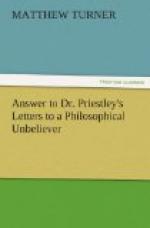This Dr. P. at least allows even while he keeps reasoning
about a Deity, which he calls an infinite cause capable
of comprehending itself, though nobody is capable
of comprehending it, and of which we therefore can
have no experience. Yet he will assert, that
thinking
persons seldom are convinced by
thinking.
This is odd language for a reasoner. When another
philosopher or divine attempts to prove a God in their
own way, Dr. Priestley can readily see his fallacies
and absurdities. Dr. Clarke, the former great
champion of God Almighty, is made very light of.
He thought, foolish man, to prove the existence of
a Deity merely by our having an idea of that existence,
which would go to prove the truth of every unnatural
conceit that ever entered into the heart of man; and
contended farther that it would be equally absurd
to suppose no Deity as two and two did not make four.
It would indeed be absurd, says Dr. Priestley provided
we agreed that the universe is a
caused existence,
for God is the name we give for the cause of the universe,
which in such case must exist. It is only denying
that the universe is a caused existence, and then
the absurdity is taken away. Dr. Priestley, for
the sake of making Dr. Clarke absurd, will readily
allow the denial capable of being made; and for the
same purpose he seems gravely to have taken upon himself
to prove that school-boy’s difficulty, that
two and two do make four, for he says, that four is
the term agreed upon in language to be given to the
sum total of two and two, and that to deny the Deity
is at least not so absurd as to say that two and two
do not make four.
Dr. Priestley says he finds no difficulty in excluding
every thing from the mind except space and duration.
He allows then at least, that there is no manifest
absurdity in supposing there is no Deity, for nothing
can be proved by reasoning if the conclusion can be
denied without absurdity, nor can there be a manifest
absurdity in denying the existence of what there is
no difficulty in excluding from the mind. Yet
after all he adds (somewhat inconsistently) that we
cannot exclude the idea of a Deity, if we do not exclude
an existent universe. This Deity he defines to
be a most simple Being; simple and infinite; terms
which but ill agree together.
The infinite or boundless existence of this pretended
Deity is a property more insisted upon than any other,
and whatever other properties are given to him they
are all in the infinite degree. The properties
alledged to be proved are, eternity, infinite knowledge
and power, unchangeableness, unity, omnipotence, action
from all eternity, and independence. Benevolence
and moral government are also ascribed to him but
confessedly with a less degree of certainty, though
the most desireable of all his given properties.
Upon the subject of benevolence, Dr. Priestley only
advances, that where it is not proved by the happiness
of his creatures to exist, he would rather chuse to




